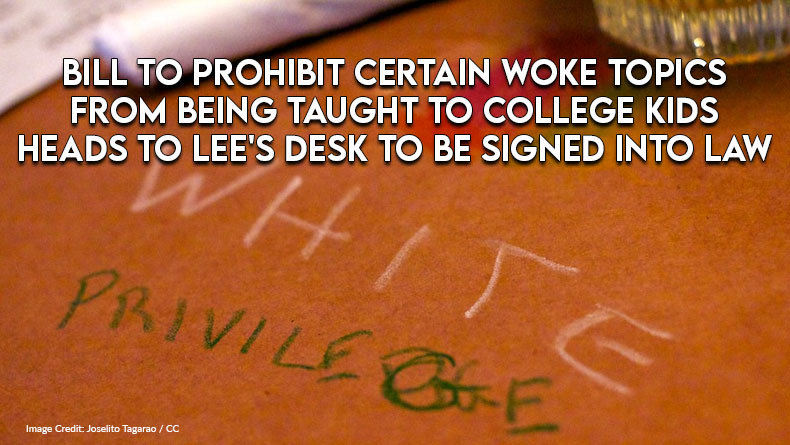Image Credit: Joselito Tagarao / CC
The Tennessee Conservative [By Kelly M. Jackson] –
Last week a bill that will prohibit topics such as “white privilege” or “unconscious bias” from being integrated into public university curriculums across the state of Tennessee, headed to Governor Bill Lee’s Desk to be signed into law.
HB1376, sponsored by Representative John Ragan (R-D33-Oak Ridge) and Senator Joey Hensley (R-D28-Hohenwald), is intended to keep what the new law calls “divisive concepts” out of college course curriculums, so the students can experience a true diversity of intellectual thought.

The definition of what the law considers a “divisive concept” is essentially sorting people based on their immutable characteristics like race, gender, or biological sex into groups of what some class materials characterize as “subordinate” and “dominant”. The implication is that those who are part of the “dominant group” will always have opportunities and special treatment as compared to those of the “subordinate group.” It is also implied that the “subordinate group” will never have equal treatment to the “dominant group” regardless of other possible circumstances like socio-economic status.
Basically, these concepts put people into categories of “victim” and “oppressor” due to characteristics they were born with and cannot change, minimalizing a person’s value or potential down to what you see with your eyes, versus who they are mentally, spiritually and intellectually.
In recent years, these concepts have crept into college classrooms at an alarming rate and have turned higher education into what many consider indoctrination camps, instead of places where open discussion of all ideas is not only nurtured but expected.
Take for instance, a course that was recently taught at Belmont University.
The Tennessee Conservative received a rubric for an assignment for a course at Belmont necessary for graduation in order to satisfy the Diversity, Equity, and Inclusion requirement which is now part of the university’s general education standard. All students must complete this requirement in order to obtain a degree from the college. Belmont University being a private institution would not be subject to the new law.
For Belmont’s Psych 3895.02, a course called Psychology of Race, a paper was required that forced students to identify themselves as members of groups that in the professor’s view were conclusively and inherently “privileged” and how their lives are made better than others who don’t happen to share the same immutable characteristics.
The groups the professor considered privileged were white people, males, and heterosexuals. If a student happened to be all three of those things, yet still had to work their way through college to make up for what the academic scholarships didn’t cover because the student came from a family that had an annual income of less than $50,000 a year, the student still had to explain how their life was “privileged”.
In comparison, a black student that is also a gay female who grew up in one of the wealthy suburbs of their city and attended private schools, had college educated parents who had an annual income in the high six figures, would not be considered “privileged”.

The following comes directly from the assignment:
• What is white privilege? How is white privilege related to systematic/institutional racism, power, and racial discrimination?
• Identify 5 specific examples of white privilege from your life and describe them.
• Give an example (not already used above) of white privilege in at least 3 of the following social institutions: education; the workforce/corporate world; government; media; language; religion.
• How would your life be different if your race privilege were taken away?
• How does white privilege affect, alter, shape, change you psychologically? How does it shape how you view race, people of color, white people, and your perceptions of discrimination?
• How does white privilege impact, influence, alter, affect your interactions with white people versus people of color?
• What specific actions can you take within your own sphere of influence to challenge or deconstruct white privilege?
• How does this form of privilege connect to intersectional theory?

Students who chose not to participate in the above assignment would fail the course. So, they were left with the option of admitting they were “oppressors”, or take a failing grade.
To be forced to participate in such a self-deprecating exercise at the cost of tens of thousands of dollars is considered egregious by most Tennesseans, and as far as our legislators are concerned, it should be illegal. And now, in at least the public colleges and universities across the state, it will be.


About the Author: Kelly Jackson is a recent escapee from corporate America, and a California refugee to Tennessee. Christ follower, Wife and Mom of three amazing teenagers. She has a BA in Comm from Point Loma Nazarene University, and has a background in law enforcement and human resources. Since the summer of 2020, she has spent any and all free time in the trenches with local grassroots orgs, including Mom’s for Liberty Williamson County and Tennessee Stands as a core member. Outspoken advocate for parents rights, medical freedom, and individual liberty. Kelly can be reached at kelly@tennesseeconservativenews.com.



4 Responses
Lee stands up to a extent to WOKE ness but not the 2nd. Amendment!!!!
I’m guessing yall think woke is actually some sort of scary term, Jesus would be the most woke person you ever met… Think about that. Woke means to care of others, be considerate, not being hateful.
Thanks to Kelly Jackson and TCN.
Parents should discourage their kids from going to Belmont. It is obviously “Woke”.
Wow, conservatives really are afraid of the first amendment. What a joke.